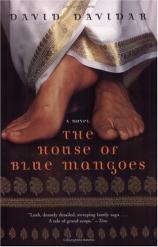The House of Blue Mangoes
Review
The House of Blue Mangoes
In THE HOUSE OF BLUE MANGOES, David Davidar's embroidered prose at times achieves sublime heights. Adept at setting the scene, he lavishly communicates a sense of place and skillfully explores the confluence of home, identity, and familial ties. Passionate affairs, assassinations, caste wars, and household acrimony are inextricably linked to the Dorai family's home --- the house of blue mangoes of the title --- in the ocean-side village of Chevathar. No matter how far members of the clan may travel, they're always drawn back to their ancestral land.
Sweeping, epic and wholly ambitious, Davidar's 500-plus-page novel chronicles three generations of the Dorai clan. Covering 1899-1947, a turbulent period that saw the fall of the British Raj, the turmoil of caste wars, the rise of Gandhi, and the culmination of independence, the story is at turns heartbreaking, humorous and moving, but attempts entirely too much. As a result, the plot lacks cohesion and most of the characters --- particularly the women --- fall flat.
The story focuses on the Dorai men, and the inescapable conflicts between father and son that tragically play out each generation, from Solomon to Daniel to Kannan. Davidar goes to great lengths to detail the unlucky lot of Indian women, so it seems somewhat appropriate that he too relegates his female characters to the margins. The only memorable one is Charity, Solomon's wife. In one exquisitely crafted scene, Davidar effectively portrays the acute pain and anxiety Charity feels for her daughter on her wedding day --- one of the few truly genuine moments in the novel.
In a world irrevocably shaken by historical events, most of his characters remain curiously unscathed. Too entangled in their own familial disputes to notice the world around them changing, the characters come across as superfluous, ignorant and entirely self-centered. For example, while Gandhi is busy becoming a household name, Daniel embarks on a ridiculous expedition to taste every mango in India for the sole purpose of confirming his opinion that Chevathar's fabled blue variety are indeed, as he suspects, the best in the land. Only Aaron, Daniel's brother, is swept up in the tide of history. He joins the struggle for freedom with catastrophic results.
Despite the flaws in character development, Davidar's prose, for the most part, flows at a rapid, fluid clip. At times, however, his usually lyrical writing plods along at a most cumbersome pace --- a tiresomely detailed description of how to brew tea immediately comes to mind. But the author eloquently conveys the raw beauty and power of the Indian landscape, and the cycle of the seasons and day turning into night provide a sense of the wheel turning and the steady progression of time.
This multigenerational family epic follows the tradition of Vikram Seth's A SUITBALE BOY and Gabriel Gárcia Márquez's ONE HUNDRED YEARS OF SOLITUDE. The novel, however, possesses neither the lucidity of Seth nor the sheer poetry of Márquez.
As a publisher at India's Penguin division, Davidar has watched some of his country's finest writers blossom. With his debut novel, he's making a bid to be included among the ranks of Seth, Arundhati Roy, Rohinton Mistry, and Vikram Chandra. THE HOUSE OF BLUE MANGOES, albeit an ambitious debut that shows promise for Davidar's future works, fails to deliver.
Reviewed by Jen Robbins on January 22, 2011
The House of Blue Mangoes
- Publication Date: March 1, 2003
- Genres: Fiction
- Paperback: 432 pages
- Publisher: Harper Perennial
- ISBN-10: 0060936789
- ISBN-13: 9780060936785



